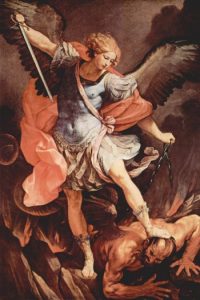Q: Can Melkor Ever Return?
ANSWER: A reader wrote in to ask “What exactly happened to Morgoth at the end of the First Age, after the War of Wrath? Is his return a possibility?”
The story of Melkor went through many changes and you have to accept all interpretations with a grain of salt. Melkor’s fate is one of those unfinished details that was in part left ambiguous and in part modified over time.

The original character, Melko, was simply a fictional pagan god just as the other Valar were fictional pagan gods. It was J.R.R. Tolkien’s intention to write a fictional English mythology (The Book of Lost Tales) that would describe in a series of myths how the world was created, shaped through “lost” ages of history, and eventually left in the hands of mortal men (around the time that the Anglo-Saxons began settling in Britain in the mid-5th Century CE). The myth cycle was to have an end of the world story similar to the Norse Ragnarok.
And when Tolkien abandoned the English mythology for an ambiguous Elvish mythology Turin was supposed to come back and slay Melkor (the successor of Melko). That was also supposed to happen in an “end of times” scenario.
But all of that eventually went away. J.R.R. Tolkien abandoned the concept fans associate with the Second Prophecy of Mandos. And in the published Silmarillion Melkor is exiled from Time and Space: “But Morgoth himself the Valar thrust through the Door of Night beyond the Walls of the World, into the Timeless Void; and a guard is set for ever on those walls, and Eärendil keeps watch upon the ramparts of the sky.”
This is the official ending of The Silmarillion because Christopher Tolkien had to provide some sort of closure. He admonished readers not to seek consistency between the book and other works or even within itself for that consistency never existed. He was charged with publishing a full story and he published a full story.
In his private thoughts and notes J.R.R. Tolkien did leave open the possibility of Melkor’s return. After all he identified Melkor with Satan or Lucifer, the highest of the angels in the Bible who rebelled against God and who is predicted to one day fall to Earth. And after that he will be imprisoned for a thousand years before being released again to launch another rebellion.
If Melkor is a fictional representation of Satan then indeed the author expects him to return but not in a predictable fashion. Tolkien seems to have retreated from apocalyptic fiction. His motivations were mixed or complex. On the one hand he left behind the idea of a faux pagan mythology to create a story that was “Catholic” in nature. On the other hand he wanted to rewrite the fictional history of his world so that it agreed more with scientific knowledge. And he also discouraged any thought of identifying his fiction with allegory. A full allegorical cycle might indeed require an apocalyptic story, as C.S. Lewis wrote for his Narnia books.
As for the question at hand, there is no canonical or definitive answer. We have different stories, each provided in its own literary context and these contexts are not interchangeable. In one context Melko is slain. In another Melkor is ejected from Time and Space for ever. In another context he will gather his strength and eventually return. The last context is the one many readers prefer but it does not fit with either the published Silmarillion or The Lord of the Rings. You can weave together your own Middle-earth from fragments of different stories; many people do. But in any story you contrive you will be departing from Tolkien’s own Middle-earth. He never provided a final answer to the question. I don’t think he was ever fully satisfied with any of the Melkor endings he composed.
# # #
Have you read our other Tolkien and Middle-earth Questions and Answers articles?

I think that, since the Devil tried to tempt the Lord while He was in the desert, we may conclude that Morgoth would return to Arda so the “Legendarium” did not contradict the Gospel. However, I doubt a hypothetical story of Melkor’s return would follow the Apocalipsis’s account closely, as it is an allegorical book – if I recall correctly, some notes in my edition of the Bible of Jerusalem said that certain things represented Rome, for instance.
Do you think, Mr Martínez, that Manwë could be the archangel Saint Michael? The fact that Finrod named him as the force struggling against Morgoth and something said in “Myths Transformed” about him being the only one of the Ainur within Eä who was always in the presence of Ilúvatar point to it.
If Tolkien never settled on an ending satisfying to him, then providing one does not necessarily depart from Tolkien’s Middle Earth if his intent was others could build upon the foundations he has set – in doing so multiple different views may be consistent with that intent but inconsistent with each other. I wonder if in his thinking he could not come to a satisfactory conclusion to the Melkorian story and also to another big story in Middle Earth; but perhaps that was not his heart.
PS: My closing sentence should mean that perhaps his heart was for another big story.